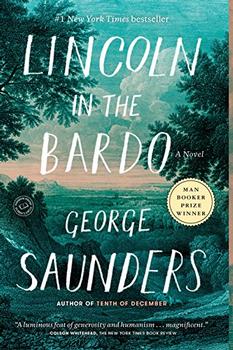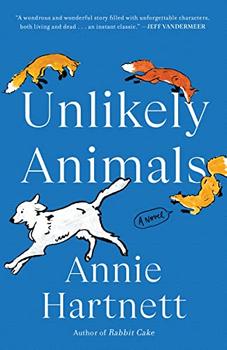Summary | Excerpt | Reviews | Beyond the book | Read-Alikes | Genres & Themes | Author Bio

George Saunders' Lincoln in the Bardo is a philosophy discourse brilliantly disguised as a novel. This stunning work hits all the right chords, imploring us to be kind to one another during a time when it seems hatred and distrust are increasingly the norm. It reminds us how important it is to savor, moment by moment, this truly beautiful the world in which we live.
As the book opens, President Abraham Lincoln's younger son, nine-year-old Willie, has died of typhoid fever but has not yet crossed over into the afterlife; he is stuck in the bardo, an intermediate state between life and death (see 'Beyond the Book'). He finds himself in a surreal world filled with others who have not yet moved on. Three long-term residents—Hans Vollman, Roger Bevins and the Reverend Everly Thomas— befriend Willie. The book revolves around their attempts to get the boy to relinquish his existence, as the young, in particular, are not supposed to linger in the land in-between.
The writing style is the first of many striking aspects of this novel. Much of the narrative involves back-and-forth communication between the primary trio as they convey information to the reader, with the speaker being listed at the end of each statement. In one scene, for example, they discuss a Mrs. Delaney, who remained in the bardo in a state of confusion because she'd cheated on her husband with his brother but loved both:
This format can seem off-putting at first, but somehow it works. The main trio is very well spoken and interactions among them are relatively easy to follow. A few other denizens of the cemetery are much harder to understand. Willie's thoughts aren't as articulate, and other individuals' musings are barely coherent. Willie describing Bevins:
Sometimes the narrative switches to monologues which go on for several paragraphs, and determining whose story is being relayed in such cases can be challenging. While this was confusing for the first few pages, it didn't take me long to adapt.
The novel must have required a lot of research. It includes snippets from accounts of real-life events such as the presidential dinner held the night Willie Lincoln died and news reports of the Civil War. The author uses quotes from wildly varying sources such as Team of Rivals by Doris Kearns Goodwin; Behind the Scenes: Or, Thirty Years a Slave, and Four Years in the White House, by Elizabeth Keckley; private letters written by Civil War soldiers to their families; newspaper accounts of events; and even quotes from watchman Jack Manders from the Oak Hill Cemetery logbook, taken from the night of February 25, 1862, when Abe Lincoln visited his son's body. The style is unique here too in that the author includes no original text in these chapters. Scenes are described entirely with sentences from external sources. Similar to the conversations between Vollman, Bevins and Thomas, each citation is often just a sentence or two before flowing into another reference.
As part of the action, President Lincoln comes to visit Willie, and both Vollman and Bevins discover they can enter the leader's body and experience his feelings. Not only does Lincoln mourn the death of his beloved child, he also draws parallels to the other parents whose sons have died as a result of the war he continues to authorize in spite of the mounting death toll; his grief, his struggles and his ultimate acceptance of his role are nothing short of heartbreaking.
In spite of the disjointed feeling one may get from the quotes included here, the book contains a surprising amount of emotional depth. Buried within are profound statements about the need to appreciate life in the here and now, while one is still able. That's not to say the book is unrelentingly gloomy; parts of it are very funny and I did find it ultimately uplifting. And, although I found deep meaning in the novel—as well as plenty to think about—it never felt dense or text-bookish. The concepts Saunders espouses are universal and not geared to any one philosophy or religion. Although the bardo is a Buddhist concept, throughout, the author really talks about what it means to be human.
It's too soon to say if the book had a life-changing impact on me, but it certainly transformed my outlook in the near term. I've been encouraged to look at those around me with more compassion and to appreciate all the tiny, everyday miracles that make up a life—to notice more and to look at the world with renewed wonder. Lincoln in the Bardo is a book I desperately want to share with others, and I can think of no higher recommendation; it's literally unforgettable.
![]() This review was originally published in The BookBrowse Review in February 2017, and has been updated for the
February 2018 edition.
Click here to go to this issue.
This review was originally published in The BookBrowse Review in February 2017, and has been updated for the
February 2018 edition.
Click here to go to this issue.

If you liked Lincoln in the Bardo, try these:

by Anne Michaels
Published 2025
A breathtaking and ineffable new novel from the author of the international best sellers Fugitive Pieces and The Winter Vault—a novel of love and loyalty across generations, at once sweeping and intimate

by Annie Hartnett
Published 2023
A lost young woman returns to small-town New Hampshire under the strangest of circumstances in this one-of-a-kind novel of life, death, and whatever comes after from the acclaimed author of Rabbit Cake.
We've heard that a million monkeys at a million keyboards could produce the complete works of Shakespeare...
Click Here to find out who said this, as well as discovering other famous literary quotes!
Your guide toexceptional books
BookBrowse seeks out and recommends the best in contemporary fiction and nonfiction—books that not only engage and entertain but also deepen our understanding of ourselves and the world around us.